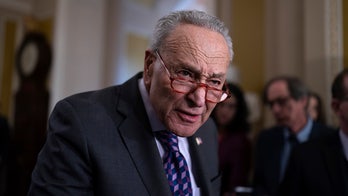Senior Obama administration officials tell Fox News the move to impose sanctions against Iran for it's feared pursuit of nuclear weapons will begin in January, but it will take time to gain speed and specificity.
The move will come after the expiration of the Dec. 31 deadline imposed by President Barack Obama.
Following that, no move will be undertaken until the United Nations Security Council reconstitutes itself. That process requires replacing out-going non-permanent Security Council members with nations about to begin their two-year Security Council terms.
The new Security Council terms begin New Year's Day for Bosnia and Herzegovina, Brazil, Gabon, Lebanon and Nigeria. They will replace Burkina Faso, Costa Rica, Croatia, Libya and Vietnam.
The White House has already acknowledged it will not draw up a list of sanctions and start pushing for their approval right after New Year's Day.
A senior administration official told Fox News on Tuesday the process will likely remain under wraps for the first part of January as U.S. officials test the water on what allied powers will accept in terms of punishing Iran.
Another top White House official told Fox News there is a high degree of confidence Russia will back a confrontational strategy against Iran once the process begins.
Obama discussed Iran on Friday with Russian President Dmitri Medvedev in Copenhagen, Denmark, as part of the global climate change negotiations.
"We discuss this with them every time we sit down with them and every time they've told us, 'We'll be with you.'"
Despite these private assurances, this White House official said, there are no guarantees. "We'll see what happens when all of this begins to take shape, but we have reason to be hopeful."
White House Press Secretary Robert Gibbs on Tuesday brushed aside a speech from Iranian President Mahmoud Ahmadinejad dismissing the end-of-2009 nuclear deadline.
"Mr. Ahmadinejad may not recognize, for whatever reason, the deadline that looms, but that is a very real deadline for the international community," Gibbs said. "And I think all of those involved in the P-5-plus-1 (U.S., Britain, France, China, Russia and Germany) would encourage Iran to take that deadline as seriously as it's being taken by us to live up to their responsibilities."
The White House began to make the case that sanctions -- should they come -- will be Iran's fault and a multilateral decision.
"That's an Iranian decision," Gibbs said about whether the White House will pursue sanctions. "That's not a decision that we in the P-5-plus-1 will make. The decision for them to live up to their responsibilities is their decision. We have offered them a different path. If they decide not to take it, then (we) will move accordingly."
The White House won't discuss the kind of sanctions under consideration. Experts on the region say access to gasoline and currency appear likely components of a modest package.
"I think we're going to see something, " said Jon Alterman at the Center for Strategic and International Studies. "I don't think we're going to see people swinging for the fences. This is not the way to force Iran to just buckle under."
Alterman said the other variable is whether Israel will consider Iran's defiance of the year-end-deadline (agreed to in part during Israeli Prime Minister Benjamin Netanyahu's meeting with Obama on May 18.)
"I think one of the great uncertainties in all of this, is where the red lines are," Alterman said. "What the Israeli's trigger point is, what the American's trigger point is. I think the Iranians think might they have a sense of it, but certainly, the uncertainly over what the Israelis might do keeps the U.S. awake and keeps the Iranians awake at night ."
White House critics say the year-long wait for Iran to give up its feared pursuit of nuclear weapons has only served to undermine U.S. regional interests.
"Tehran has been given an extra year in which to build its nuclear weapons program while the White House has been dithering," said Nile Gardiner of the Heritage Foundation. "U.S. global power has been undermined by an image of weakness and indecision. The strategy of engagement ...has certainly worked to benefit of Mahmoud Ahmadinejad and his barbaric regime."




